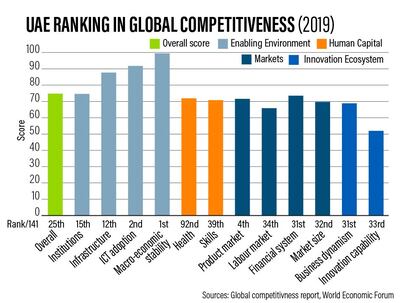The UAE has maintained its top spot for a fourth year as the most competitive economy in the Middle East and North Africa. The country improved its score in eight out of 12 categories including macroeconomic stability, infrastructure, technology and business dynamism, according to the World Economic Forum.
The UAE, the second largest Arab economy, jumped two places to be 25th globally in the 2019 Global Competitiveness Report published annually by the organisation. The survey ranks 140 countries in the index based on their performance in 12 key economic pillars.
The Emirates scored a perfect 100 in macroeconomic stability to join Singapore, which rose up in the ranks ahead of the US to become the most competitive country globally.
In information and communications technology adoption, the UAE was ranked second overall after South Korea and 4th in product market, an indicator that assesses domestic market competition and openness for trade, according to the report.
The UAE's performance improved in 52 out of 103 sub-indicators under the primary 12 pillars. The country ranked among the top five performing economies under 19 indicators, and among the top 20 worldwide in 57 of them this year.
The country is pursuing a strategy to "improve and develop performance in all competitiveness indicators, especially those associated with the UAE Centennial 2071 project", said Mohammed Al Gergawi, UAE Minister of Cabinet Affairs and the Future and chairman of the Federal Competitiveness and Statistics Authority.
This approach will be achieved through modernisiation and updating of legislations and streamlining of procedures as well as the adoption of innovation to move up on the scale of global competitiveness and deliver the leadership's vision and sustain development in competitiveness indicators, he was reported as saying by the state news agency Wam.
The UAE is implementing a series of reforms aimed at improving the ease of doing business in the country, attracting foreign investors, creating jobs and diversifying its economy away from oil. The country has allowed 100 per cent foreign ownership of companies in 13 sectors from manufacturing to renewable energy, relaxed visa restrictions and provided incentives for small and medium enterprises.
Corporate fines were waived in Dubai and Abu Dhabi in 2018. This year, the Ministry of Economy cancelled fees on more than 100 government services and reduced charges for others in a bid to lower the cost of doing business in the country.
''The UAE's lead in macroeconomic stability is yet another proof of the vibrancy, strength and resilience of the national economy to ride over challenges facing the world economy today,'' said Sultan Al Mansouri, the Minister of Economy, according to Wam.
The report, he said, recognises the government's ability to respond promptly to global transformations and to adopt the most advanced technologies.
Saudi Arabia, the biggest Arab economy, took the 36th spot in the global competitiveness rankings, while Bahrain, the smallest Arabian Gulf economy was ranked 45th in the global list, followed by Kuwait. Oman dropped six places to the 53rd position, while Jordan climbed three levels to 70. Morocco and Tunisia remained unchanged in 75th and 87th place, respectively. Lebanon dropped eight levels to 88th, a sign of the difficult times its economy is facing.
A decade on from the global financial crisis, the world's economy remains locked in a cycle of low or flat productivity growth despite the injection of more than $10 trillion (Dh36.7tn) by central banks. While these unprecedented measures were successful in averting a deeper recession, they are not enough to catalyse the allocation of resources towards productivity-enhancing investments in the private and public sectors, WEF said in the report.
As monetary policies begin to run out of steam, it is crucial for economies to boost research and development, enhance the skills base of the current and future workforce, develop new infrastructure and integrate new technologies, among other measures, WEF said.



